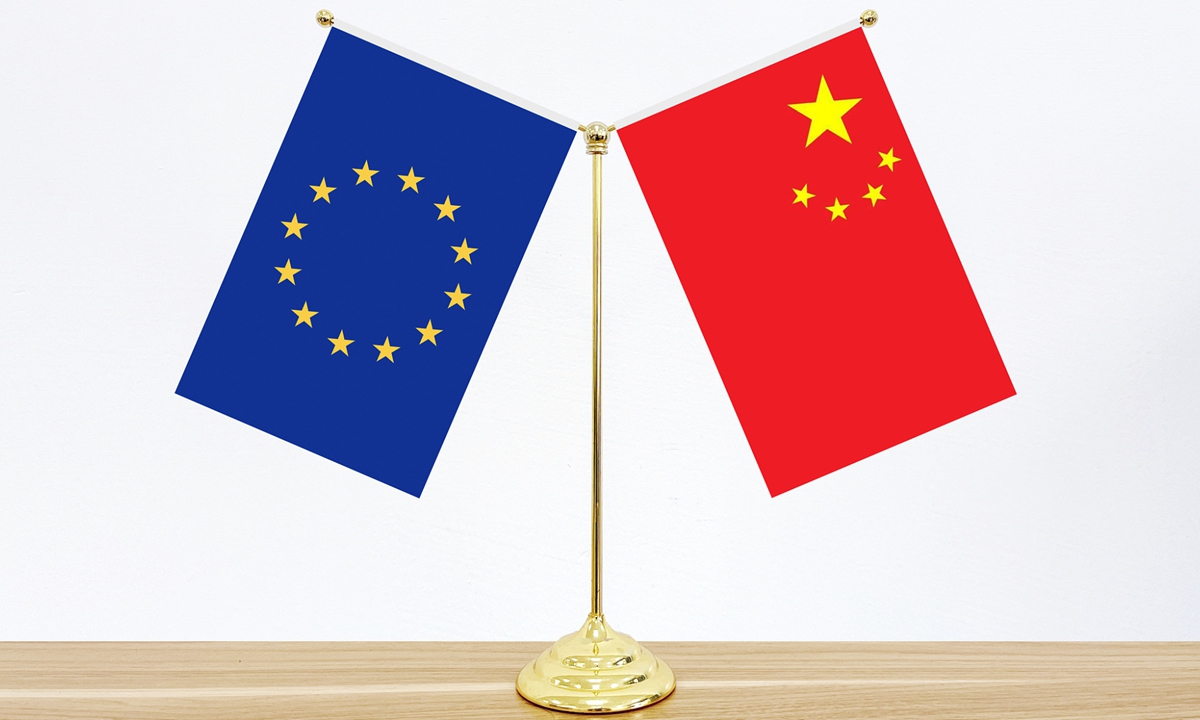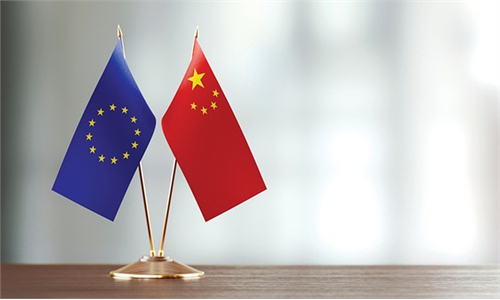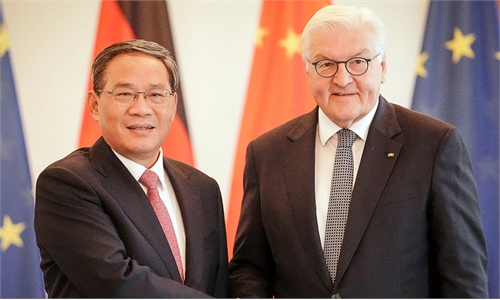European Economic Security Strategy fending off Chinese investment is wrong: experts
EU unveils economic security strategy, raising risk for bloc

China EU Photo:VCG
The European Commission, the EU's executive arm, unveiled a European Economic Security Strategy on Tuesday, as the Joint Communication focuses on "minimizing risks" arising from certain economic flows in the context of rising geopolitical tensions.
Although the strategy did not single out China, it is believed that the strategy has an eye on "rivals such as China", as Reuters reported that the document stresses partnering with those countries that share EU concerns, and the strategy uses the phrase "de-risking," which is regarded as reducing economic reliance on China.
Chinese experts said that the "de-risking" proposed by some politicians in the EU is completely unnecessary, for China is not the source of risk at all. The so-called economic security is setting up barriers to Chinese investment in the EU, which will harm the interests of European companies. The relationship between China and Europe should be based on pragmatic cooperation instead of geopolitics, they said.
The strategy said the risks presented by certain economic linkages are evolving quickly in the current geopolitical and technological environment, and are increasingly merging with security concerns. This is why the EU must develop a comprehensive approach to commonly identifying, assessing and managing risks to its economic security, according to the official website of the European Commission.
The EU strategy proposes to carry out a thorough assessment of risks to economic security including risks to the resilience of the supply chains, including energy security, risks to physical and cyber security of critical infrastructure, risks related to technology leakage, and risks of weaponization of economic dependencies or economic coercion.
Reuters reported that the emerging risks could come from exports and investments that let know-how leak to foreign rivals in a "narrow set of key enabling technologies with military implication", citing quantum computing, artificial intelligence, 6G, biotechnology and robotics as examples.
The strategy was released as the Chinese Premier Li Qiang is paying an official visit to Germany.
Chinese experts said that some European politicians' push for "decoupling" or "de-risking" is not feasible or realistic given the fact that there is great room for dialogue and cooperation between the two sides in multiple sectors.
On Monday, Hamburger Hafen und Logistik AG and Cosco Shipping Ports have finalized the minority shareholding in Container Terminal Tollerort (CTT). According to the statement, Cosco became the owner of a 24.99 percent stake in the CTT.
The deal has once sparked heated debate within the German government. Cosco's initial plan to acquire a 35 percent stake in the Tollerort container terminal was rejected by the German government. In October last year, the German government approved in principle the deal despite political concerns. However, under the pressure of several ministers, COSCO was only allowed to acquire no more than 25 percent of the shares.
In May, the German federal government gave the green light to the deal.
It seems that the EU is now divided on how to engage China, experts said. The EU does not want to give up the Chinese market, but some politicians intend to seek a break-up from China, as the latter's rapid industrial development has made the country more competitive than Europe in many factors, Hu Qimu, deputy secretary general of the digital real economies integration Forum 50, told the Global Times on Tuesday.
But it is the fact that China and the EU have a lot of common ground to continue mutually beneficiary cooperation, Hu said.
"EU cannot afford to lose China's industrial and supply chain as there is no replacement to China, with the same production capacity, processing capacity and low cost," Hu said.
China is willing to work with Germany to push bilateral ties to a new level, and inject more positive energy, stability into the world, Chinese Premier Li Qiang told German Chancellor Olaf Scholz on Tuesday during his ongoing visit to Germany.
For his part, Scholz stressed that Germany opposes any form of de-coupling, and explained that "de-risking" is not "de-sinicization." Germany is willing to develop stable relations with China, and deepen bilateral exchanges and cooperation.
Chinese Premier Li Qiang stressed on Monday that the biggest risk for China and Germany is failure to cooperate, and the biggest security threat for them is failure to develop. Li made the remark in a meeting with German President Frank-Walter Steinmeier.
Li, who kicked off his five-day trip to Germany and France on Sunday, stated that there are no fundamental conflicts of interest between China and Germany, and that the foundation for their cooperation is solid with strong development potential.
"As far as I know, it is the Western media have sensationalized the document in a move to sow discord between China and the EU," Yang Chengyu, an assistant research fellow at the Institute of European Studies of the Chinese Academy of Social Sciences, told the Global Times on Tuesday.
While some European politicians are overly hyping up so-called "de-risking," the real purpose of the move is dealing with extreme situations such as global supply chain disruption, Yang said.
Yang said that there is great room for China and the EU to extend dialogue and expand partnership in multiple sectors, to further economic and trade cooperation and ramp up efforts together to fight climate change.


